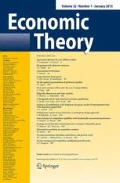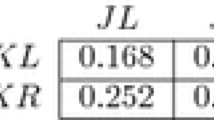Summary.
Two approaches have been proposed in the literature to refine the rationalizability solution concept: either assuming that a player believes that with small probability her opponents choose strategies that are irrational, or assuming that their is a small amount of payoff uncertainty. We show that both approaches lead to the same refinement if strategy perturbations are made according to the concept of weakly perfect rationalizability, and if there is payoff uncertainty as in Dekel and Fudenberg [J. of Econ. Theory 52 (1990), 243–267]. For both cases, the strategies that survive are obtained by starting with one round of elimination of weakly dominated strategies followed by many rounds of elimination of strictly dominated strategies.
Similar content being viewed by others
Author information
Authors and Affiliations
Additional information
Received: 10 December 1998; revised version: 26 April 1999
Rights and permissions
About this article
Cite this article
Herings, PJ., Vannetelbosch, V. The equivalence of the Dekel–Fudenberg iterative procedure and weakly perfect rationalizability. Econ Theory 15, 677–687 (2000). https://doi.org/10.1007/s001990050317
Issue Date:
DOI: https://doi.org/10.1007/s001990050317



